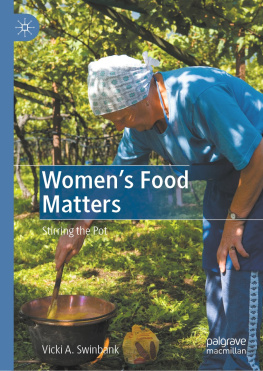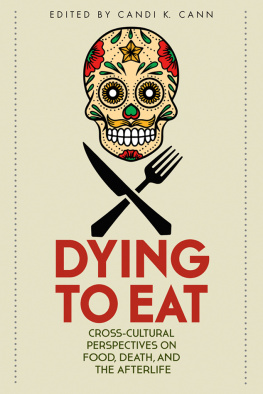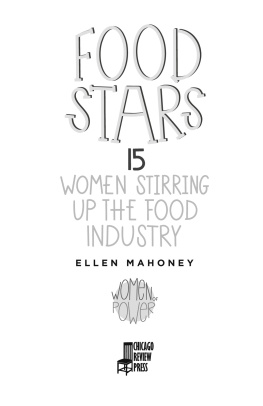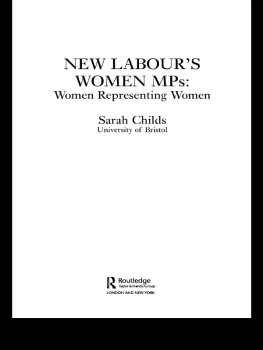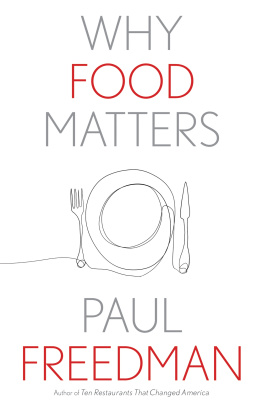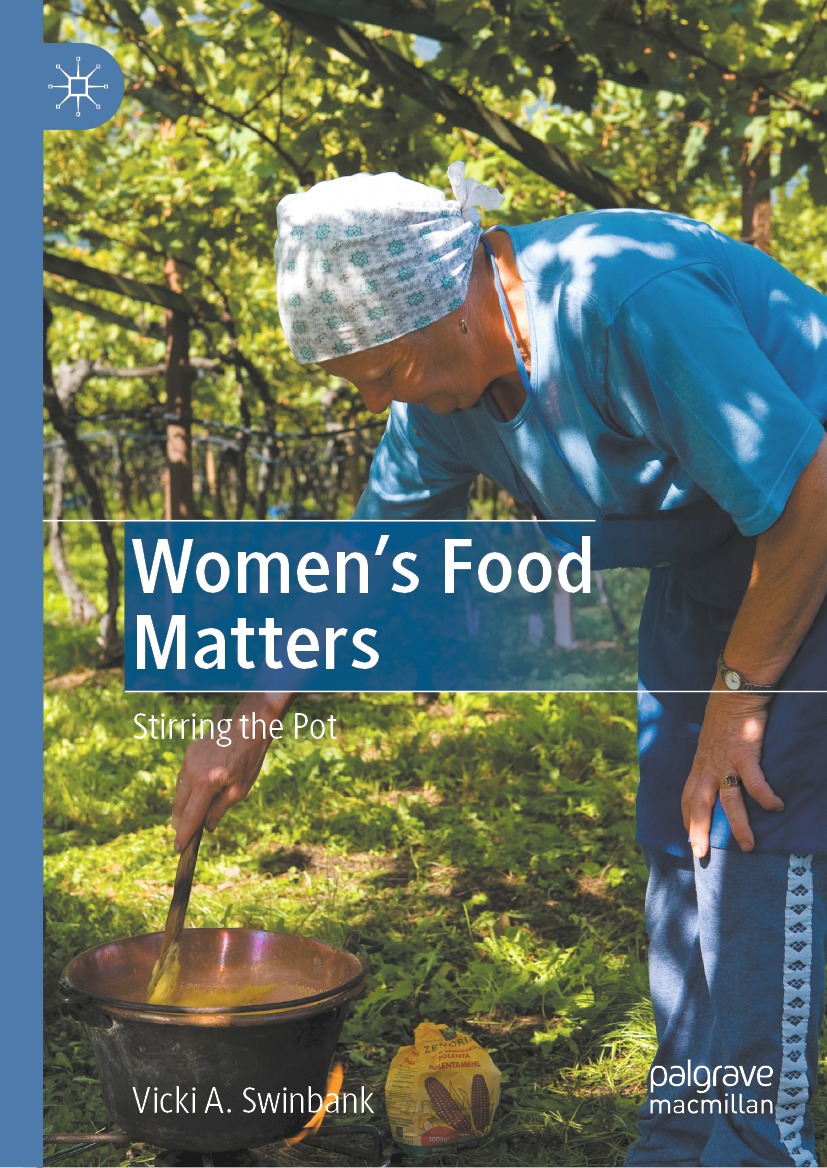Vicki A. Swinbank
Womens Food Matters
Stirring the Pot
1st ed. 2021

Logo of the publisher
Vicki A. Swinbank
Northcote, VIC, Australia
ISBN 978-3-030-70395-0 e-ISBN 978-3-030-70396-7
https://doi.org/10.1007/978-3-030-70396-7
The Editor(s) (if applicable) and The Author(s), under exclusive license to Springer Nature Switzerland AG 2021
This work is subject to copyright. All rights are solely and exclusively licensed by the Publisher, whether the whole or part of the material is concerned, specifically the rights of translation, reprinting, reuse of illustrations, recitation, broadcasting, reproduction on microfilms or in any other physical way, and transmission or information storage and retrieval, electronic adaptation, computer software, or by similar or dissimilar methodology now known or hereafter developed.
The use of general descriptive names, registered names, trademarks, service marks, etc. in this publication does not imply, even in the absence of a specific statement, that such names are exempt from the relevant protective laws and regulations and therefore free for general use.
The publisher, the authors and the editors are safe to assume that the advice and information in this book are believed to be true and accurate at the date of publication. Neither the publisher nor the authors or the editors give a warranty, expressed or implied, with respect to the material contained herein or for any errors or omissions that may have been made. The publisher remains neutral with regard to jurisdictional claims in published maps and institutional affiliations.
Cover credit: imageBROKER/Alamy Stock Photo
This Palgrave Macmillan imprint is published by the registered company Springer Nature Switzerland AG
The registered company address is: Gewerbestrasse 11, 6330 Cham, Switzerland
This groundbreaking interdisciplinary feminist study offers a new perspective on how, and why, womens food matters throughout history and in our contemporary world. As one of the first studies to combine a focus on food production, processing and cooking, on food cultures and food systems, Swinbank puts womens knowledge and creativity at center stage in the reproduction and transformation of culture and agriculture. Womens Food Matters provides a theoretically rich contribution that is jargon-free, making it an appropriate choice for classes at any level, as well as for the general reader. Destined to stir the pot of contemporary food studies.
David E. Sutton, Professor of Anthropology at Southern Illinois University
Womens Food Matters provides a comprehensive and overarching historical and cross-cultural view of womens food-work and the important role women have played in shaping the food landscape from production through consumption. Drawing from examples around the world, Swinbank illustrates how womens food knowledge and practices must be considered in addressing some of the most pressing problems facing the food system today.
Deborah Harris, Associate Professor of Sociology at Texas State University, San Marcos, Texas
Radical feminism has just taken its long-awaited seat at the food studies table. In Womens Food Matters, Vicki Swinbank reminds us that women's inter-generational food knowledge its production, preparation and consumption - is at the heart of most food cultures. In her original radical feminist analysis of women's role in various food systems throughout history, Swinbank powerfully sets out the erosion of womens knowledge by patriarchal and capitalist systems that have contributed to everything from taking credit for womens recipes in contemporary culinary culture to industrialised farming and genetically-modified crops. Womens Food Matters is consistently engaging, informative and persuasively argued; both taking us back to the wonderful memories of being in grandmas kitchen, and into the diverse and widely-politicised world of the global food system.
Natalie Jovanovski, Lecturer and DECRA Research Fellow, The University of Melbourne, Australia
In memory of my mother
whose love of cooking lives on in me
Acknowledgements
This book is a culmination of my two lifelong passions: food issues and cooking, and feminism. There are several people I would like to acknowledge without whose support and interest this book might not have seen the light of day.
I am indebted to Natalie Jovanovski for her encouragement and enthusiasm throughout this project, especially in the early stages, which strengthened my belief in the importance of my book. I would also like to thank Sue Leigh for her insightful and wise comments from reading some early drafts. My thanks go to Helen Chambers for her constant interest and helpful advice about the publishing process. My friends in the United Kingdom, Elaine Hutton and Lynne Harne followed the progress of the book from afar and were supportive from the start. I also appreciate the interest of people, both known and unknown, with whom I have talked about this project, and who said that they were looking forward to reading the book.
Above all, I am deeply grateful to Kathy Chambers for her invaluable technical support throughout the project as well as her editing assistance in the final stages; it would not have been possible without her. I am also grateful for her love, support and forbearance during the sometimes stressful writing process.
Finally, I wish to thank my editors at Palgrave Macmillan, firstly, Amelia Derkatsch in London and more recently, Nina Guttapalle in New York, who were always helpful and prompt with answers to my questions, as well as the rest of the team at Palgrave and at Springer Nature.
Contents
The Author(s), under exclusive license to Springer Nature Switzerland AG 2021
V. A. Swinbank Women's Food Matters https://doi.org/10.1007/978-3-030-70396-7_1
1. Introduction
Vicki A. Swinbank
(1)
Northcote, VIC, Australia
Keywords
Radical feminism Masculinist thinking Domestic cooking Haute cuisine Food cultures
In recent years there has been a veritable explosion in books dealing with food issues, ranging from the history of cooking to a critique of the industrialised food system. There is, however, relatively little that deals with food from a feminist perspective, with much of the existing literature focusing on womens problematic relationship with food, especially eating disorders and body image (Bordo ). Whilst this work by feminist academics has made an invaluable contribution to the literature on womens often conflicted relationship to food, my aim in this book is to examine the more positive and empowering aspects of womens involvement in food production, preparation and cooking.
My analysis in this book is from a radical feminist standpoint, that is a politics that places women and womens experiences at the centre, names the oppression of women, and involves a holistic view of the world, an analysis which probes every facet of existence for women ( Rowland and Klein , 13). Radical feminist theory is concerned about the material reality of womens lives, recognising that the personal is politicalin other words, that womens personal experiences are a consequence and reflection of the power imbalances in hetero-patriarchal society resulting from a gendered hierarchy based on sexual difference. This is exacerbated and complicated by class, race and ethnicity. Radical feminists argue that the system of male domination and female subordination that gendered power relations are based upon is

